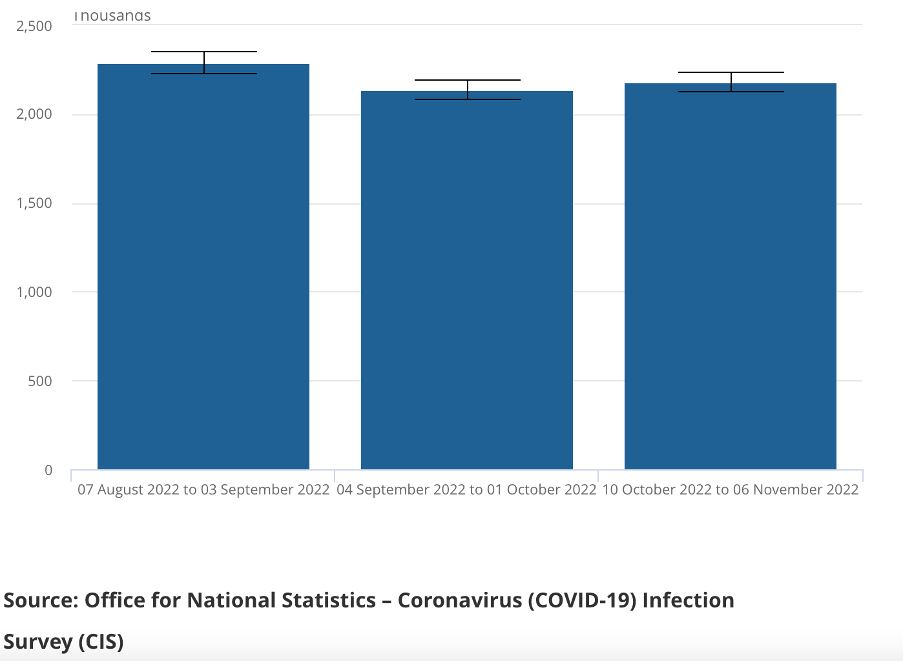Long COVID is a new global health challenge, a disease with many unanswered questions. This uncertainty creates huge issues for patients and clinicians.
Three quarters of UK long COVID sufferers are working less. In a recent survey The Office for National Statistics estimates that 2.1 million people – 3.3% of the population – were suffering from long COVID as of October 1, which it defined as symptoms that had lasted more than four weeks after a COVID-19 infection.
Of those, 73% said long COVID was limiting their day-to-day activities, and 16% – 333,000 people – said their activities had been significantly limited.
To date, more than £50 million of government funding has been invested in long COVID research projects. The bulk of this (£39.2 million) has been awarded to 19 projects
Projects examine the underlying mechanisms of long COVID, investigate symptoms such as ‘brain fog’ and breathlessness, and test possible treatments. They explore whether NHS services, such as long COVID clinics, meet people’s needs, and look at what people can do to optimise their own recovery.
The challenges presented by long COVID
The scale of chronic ill health and disability after COVID-19 has been described as the next big global health challenge. Persistent COVID-19 symptoms are common. In March 2022, the ONS survey found 1.7m people were experiencing long COVID. By November this figure has increased to 2.2m.
Figure 1: 2.2 million people were experiencing self-reported long COVID as of 6 November 2022Estimated number of people living in private households with self-reported long COVID of any duration, UK, four-week periods ending 3 September to 6 November 2022
Many unknowns remain, such as what causes long-term illness and how best to help people. There is still no professional consensus on definition and nomenclature. Without specific diagnostic criteria, clinicians and patients must live with substantial uncertainty. The risk is that people will be either over-investigated and overtreated or not receive adequate support.
What is the biological cause of long COVID?
Why the symptoms of long COVID can persist for months after the initial illness remains a mystery. Before researchers can develop treatments targeted at long COVID, they need to understand its biological causes. The predominant hypotheses are either that people with long COVID never fully clear the virus from their systems; or that the illness results from a dysfunctional immune response.
What are the symptoms?
The lasting symptoms of SARS-CoV-2 infection reported by people living with long COVID are manifold.
Fatigue was the most common symptom, reported by half (51%) of those with self-reported long COVID. Shortness of breath followed (in 34%), then loss of smell (28%), and muscle ache (24%). As a proportion of the UK population, the prevalence of self-reported long COVID was greatest in people aged 35 to 49 years, females, people living in more deprived areas, those working in social care, teaching and education or health care, and those with another health condition or disability that limits activity.
Researchers at the University of Birmingham are conducting the TLC study (Therapies for Long COVID in non-hospitalised individuals: From symptoms, patient-reported outcomes and immunology to targeted therapies). This study aims to build a clearer picture of what long COVID is. Its first report, published in the Journal of the Royal Society of Medicine, sheds light on the ten most commonly reported symptoms.
These are: fatigue, shortness of breath, muscle pain, cough, headache, joint pain, chest pain, change in sense of smell and/or taste, and diarrhoea. Other common symptoms include cognitive impairment, memory loss, anxiety and sleep disorders.
This review also suggests that people who had five or more symptoms of COVID-19 in the first week of infection are significantly more likely to develop long COVID. Further research by this group has developed a comprehensive tool to assess the symptoms of long COVID and their impact on everyday life.
“This confirms what patients have been saying from the beginning: long COVID doesn’t just affect one part of your body,” says TLC co-lead Dr Shamil Haroon. “It affects multiple systems. And has multiple effects.”
How can HR support employees with long covid?
The CIPD has produced some useful resources. See Working with long COVID:guidance to provide support
Conclusion
To unravel the mysteries of long COVID, and discover the most promising treatments and interventions, research must be wide-ranging. Many urgent questions remain unanswered. Who is most at risk of developing the condition? What is its underlying biology? And which medical treatments and rehabilitation techniques will help patients return to their daily tasks and normal wellbeing?
Considering the illness from multiple angles maximises the chances of finding answers and treatments. Ongoing research aims to find out how healthcare services can provide the best care for the many who present with ongoing symptoms following initial COVID-19 infection – and which medications will provide relief.
About P3 Business Care
P3 Business Care is a Community Interest Company and social enterprise operating across the UK. Supporting your business on a weekly basis we provide personal and proactive care to your employees and immediate family working in partnership with the company. Our Business Partners visit your business weekly developing trust & relationships so we can identify and address issues before they become crisis, absence, or staff turnover. Read more about our services here


